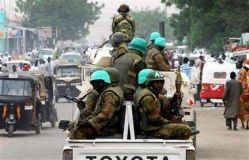Darfur’s struggling peacekeepers tread a thin line
June 9, 2006 (KUTUM, Sudan) — For African Union forces in violent Darfur, life is tough. They tread a thin line between suspicious parties to the conflict, salaries are paid late, and they live in one of the world’s harshest climates.
 For more than three years, Sudan’s remote west has been in the throes of a revolt which has forced 2.5 million people from their homes and killed tens of thousands. Rape, murder and pillage continue in violence the United States calls genocide.
For more than three years, Sudan’s remote west has been in the throes of a revolt which has forced 2.5 million people from their homes and killed tens of thousands. Rape, murder and pillage continue in violence the United States calls genocide.
Living in tents in the vast desert region, around 7,000 AU troops monitor a shaky truce. They struggle with sudden dust storms which can reduce visibility to three feet, searing heat, malaria-carrying mosquitoes and heavy seasonal rains which flood roads making them impassable for months at a time.
The AU commander in Kutum in north Darfur, Richard Lourens, said the hostile conditions reduced the life span of equipment to six months and jammed weapons. Thuraya satellite phones run out of credit, leaving remote outposts lacking communications.
There are also financial problems.
In February, an AU soldier from Chad shot and seriously wounded his superior over the late payment of wages. Officers complained they were being charged for canteen meals but had not been paid since March.
A spokesman said this week that money had now arrived and the troops would be paid.
The AU mission costs nearly $40 million a month to sustain. But unlike United Nations peacekeeping missions, which have guaranteed funding from the U.N. budget, the AU relies on donor nations to pay costs.
The U.N. Security Council is trying to persuade Sudan to accept U.N. peacekeepers by the end of the year.
AU officials have warned many times of funding crises. The Arab League pledged cash for the mission from Oct. 1, which the AU described as “medicine after death” as they only have a mandate until Sept. 30.
Western donors say they will meet on July 7 to pledge funds. But this may also be too little too late.
UNPOPULAR PEACE
Now the stretched troops face the mammoth task of helping to implement a May 5 peace deal, mediated by the AU, which only one of three rebel factions agreed to and tens of thousands of Darfuris reject.
The two hold-out rebel factions say they want more political posts, more compensation, and a role in disarming government-armed Arab militia, blamed for much of the violence.
The military head of the AU mission, Collins Ihekire, has said he wants eight extra battalions, or around 5,600 troops, to be able to deal with the new requirements under the deal.
“(But) the AU feels the donors may not be able to support more than five battalions … so we are looking at roughly 4,000 extra troops,” he told Reuters.
As well as the logistical and financial headaches, AU forces face hostility on the ground.
Thousands of Darfuris in crowded refugee camps have attacked and burned AU posts, frustrated at their inability to protect them against daily violence.
AU mediation of the May 5 deal also means it is difficult for them to patrol areas controlled by the hold-out groups.
“The AU are not neutral — we don’t want them here,” said commander Ibrahim al-Helu in the Debbis area of North Darfur. His faction supports the rebel Sudan Liberation Army (SLA) leader Abdel Wahed Mohamed al-Nur who did not sign the deal.
HOSTILE PARTNERS
Even the SLA faction, led by Minni Arcua Minnawi, which signed up to the peace deal with the government, is hostile.
“Our patrols have been stopped in areas controlled by the Minni grouping,” said Lourens.
Rebels have demanded the AU ask their permission before moving, he added, something that runs counter to the freedom of movement guaranteed by the ceasefire deal.
Even the authorities in Khartoum, who say they want donors to fund the AU rather than allow a U.N. takeover of the struggling mission, have been far from cooperative.
AU troops in their headquarters in el-Fasher are still subject to a government-imposed curfew and cannot use the airport at night. For months, Khartoum refused entry of 105 vital armoured personnel carriers that would help AU forces traverse the difficult terrain in Darfur.
The mission also wants attack helicopters in order to fulfil its mandate to protect civilians.
“If we had air … assault teams it would act as a very good deterrent to anyone wanting to attack a village,” said Lourens.
If AU troops heard about an attack, they could be at the scene within minutes, he said, rather than turning up in vehicles hours after the raids are over.
“This has an impact on the troops,” he said, explaining that soldiers felt frustrated at their inability to stop violence.
Despite all the problems, the AU limps on with optimism outweighing grim reality.
“The will is there and we will see this mission through,” said AU spokesman Noureddine Mezni.
(Reuters)
